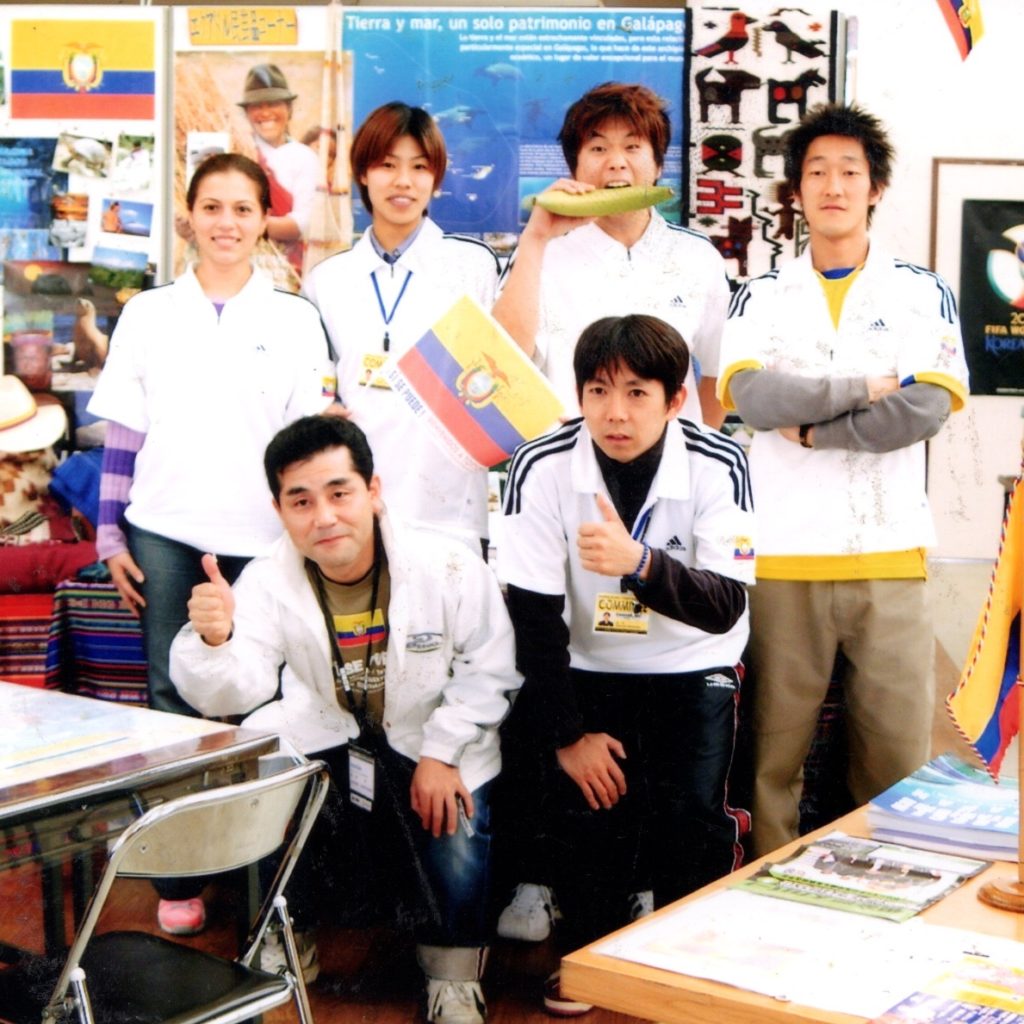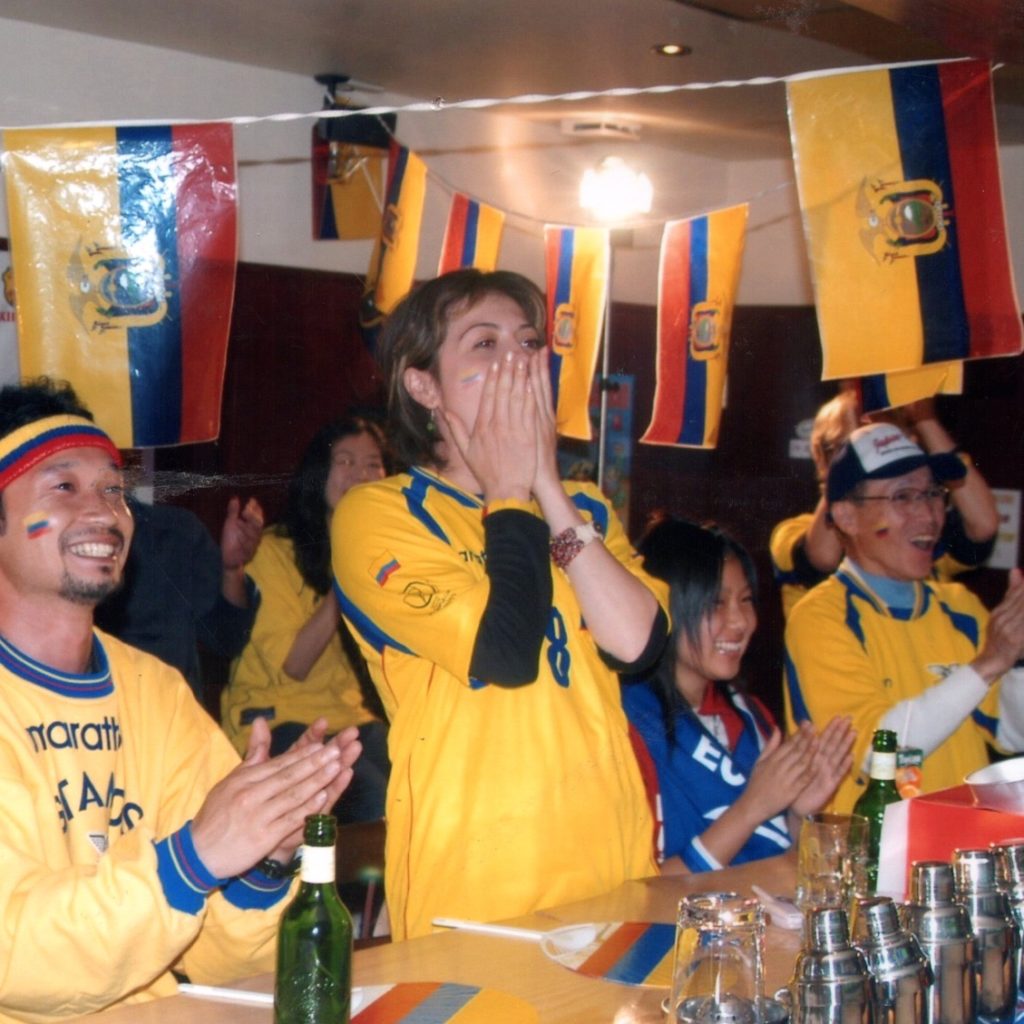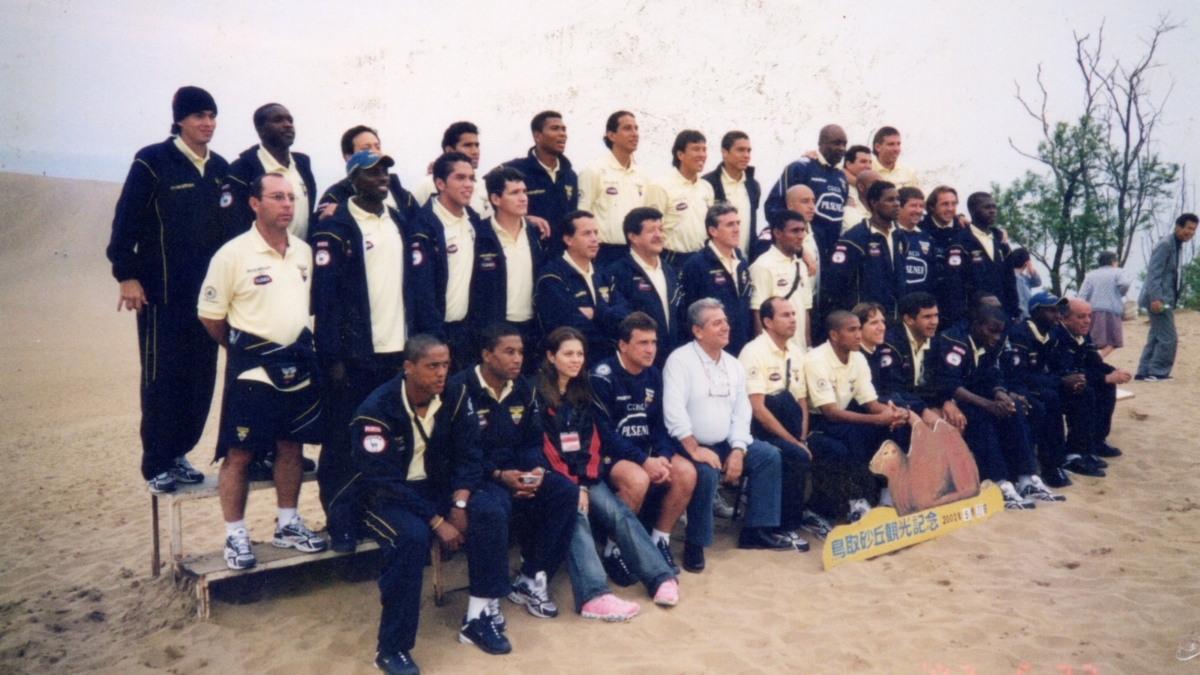By Mady García
Whether you like it or not, the soccer World Cup is a huge event that brings people together, it is like a big party. One of the moments in which Ecuador and Japan were closer than ever was, precisely, during the 2002 Japan-South Korea World Cup.
Everybody in Ecuador was aware of what was happening in Japan. Many Japanese people supported and worked to make the Ecuadorian team feel comfortable, well-fed, and relaxed so that nothing affected their concentration and performance during the matches.
I had the opportunity to experience this party up close because I was part of the stay committee of the Ecuadorian team. I also felt the happiness, nerves, and excitement of all Ecuadorians for being our first participation in a World Cup and, although I am not a soccer fan, this experience became one of the most significant of my life.
Flying to Japan
In April 2002, I was 21 years old and going through an existential crisis because I had not yet discovered what I was passionate about. I quit my job at Ecuadorian Customs and spent my savings on a plane ticket to Tokyo.
It was the first time I had gone so far from my surroundings. There, alone, while the plane was crossing the sky, fear invaded me several times. Still, the desire for adventure, and the expectations of living new experiences, buried all negative feelings within a few minutes.
From Ecuador, I was bringing hopes, a suitcase of Ecuadorian products, and a cardboard of the soccer team t-shirts that the committee members had asked me to take to Japan.
A New Home
Upon arriving in Tottori—a small city in Western Japan that hosted the Ecuadorian team and is the capital of the least populated prefecture in Japan—I breathed a different air. I’ve always had a sensitive palate and sense of smell and, I don’t know if you relate with this, but I identify cities by their characteristic smell: for me, Tottori smells like sea and mountains; and, shortly after, it began to smell like home, friends, and family.
I arrived a month before the National Team, so I was the first Ecuadorian there. The committee had set up a small stand with Ecuadorian objects for curious local visitors: no one knew anything about Ecuador.
Of course, many had heard about the Galapagos, but they didn’t even know where they where located, we had to install a map and point it out. Furthermore, the Japanese were surprised because I am white and they told me that I looked European, that was understandable knowing that the only Ecuadorians they had seen on video, until then, were the Ecuadorian soccer team boys, who are mainly afro descendants!

My Discovery
People came daily to get to know the Ecuadorian up close, to take photos with me, and to make friends. Also, journalists from local newspapers came to interview me. Even more, I was invited to television shows as a guest to introduce Ecuador’s culture and our cuisine since food is so important to the Japanese people. That’s how I discovered my taste for cooking.
Until that moment, I had only prepared a few Ecuadorian foods that my mother taught me: just four dishes–because she hates cooking–but she has made those four dishes so many times and with so much love, that they are wonderfully delicious. Oh my gosh, I just hope one day I can make ‘seco de pollo’, or chicken stew, to her level!
In Tottori, I had a computer and the Internet at hand, so I started looking for recipes and, of course, practicing them. I spent hours going through supermarkets looking for the ingredients: there wasn’t any cassava, achiote (or annatto in English), cilantro, or green plantain. The bananas cost a dollar each not to mention the tamarillos to make ‘ajicito’, which they don’t even know about there.
However, all this was not limiting: I found cilantro; I replaced the achiote with paprika—just for the color because the flavor is different. The Noboa Corporation sent us many boxes of green plantains and so I began to do what I could.
The chef of the hotel where the Ecuadorian team would stay was very worried. He was terrified by the idea that the team would not like the local food, that they would not eat well, and that this would decrease their physical performance: the Japanese think of everything! ; but, above all, they think of others!
Teaching Ecuadorian Cuisine
They invited me to the hotel kitchen, I had never entered a place like that. Suddenly, without knowing anything, I was there teaching Ecuadorian cuisine to a Japanese chef, it was a wonderful experience and the beginning of my curiosity about gastronomy, especially the Japanese!
Since we had so much plantain, we started with the ‘patacones’ because they are easy to prepare and we, Ecuadorians, are crazy about them. In addition to the nutritional qualities, they provide to an athlete.
Among other dishes, we also made shrimp ceviche, plantain’s balls soup, and ‘seco de pollo’, the Japanese loved this last one so, later, I had countless invitations to prepare it at friends’ houses, on TV shows, and even in a cooking class, I became an expert! Although it wasn’t like my mother’s, it turned out pretty well.

The Best Fans
During their stay in Japan, the Ecuadorian players felt like they were living a dream. It was their first participation in the World Cup and they were nervous but happy; They enjoyed every moment, every small detail, and every experience that Japan offered them, and they smiled and played all the time, like children.
The hotel was a beautiful gigantic spa in the mountains, with golf courses and hot springs.
Meanwhile, the host city decorated its streets with small Ecuadorian flags. All of Tottori became fan of our team, made it their own, suffered every goal scored against us and celebrated the one we did to Croatia: this was a party! A party between Ecuadorians and Japanese, united by soccer!
I am sure this was an significant experience for all of us and it made me fall in love with Japan: its people, its food, its culture, its language; so much so that when I returned to Ecuador, I couldn’t wait to return to my new home, Tottori.



Leave a Comment